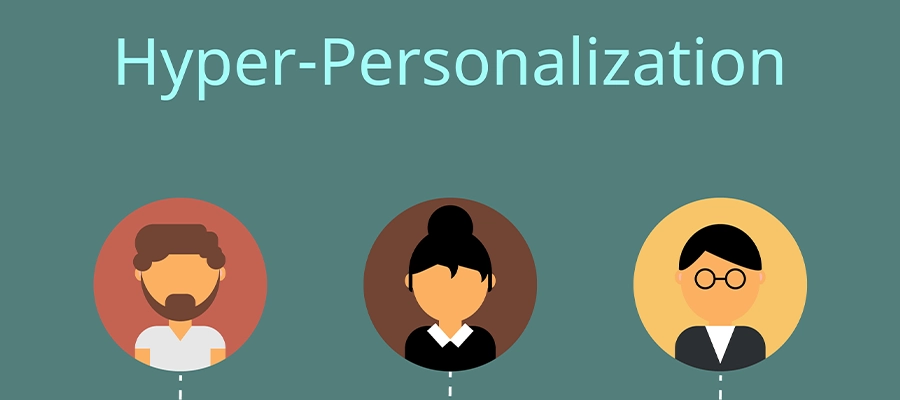In today's digital age, customer expectations are clear: they want brands to know them personally and cater to their unique needs. According to Salesforce, a staggering 66% of consumers expect brands to understand their individual preferences, and 70% believe that a company's ability to do so significantly influences their loyalty. It's no longer enough to rely on traditional mass advertising or word-of-mouth recommendations only. In this blog, we'll dive deep into personalization in digital marketing, uncovering its definition, the remarkable benefits, and the pivotal role customer data collection plays in shaping personalized marketing strategies. Welcome to the era of marketing that truly speaks to your audience.
Personalization in Digital Marketing
In today's hyper-connected digital landscape, personalized marketing is a beacon of customer-centricity, revolutionizing how businesses engage with their audience. Imagine a digital world where each customer is treated as an individual with unique preferences, needs, and desires. The importance of personalized marketing on customer engagement is nothing short of transformative. Personalization can skyrocket customer engagement, increase brand loyalty, higher conversion rates, and longer customer lifecycles. It is a fact.
Tailored Content:
Personalized marketing begins with the creation and delivery of content that is tailored to the unique interests and preferences of individual customers. Tailored digital marketing approaches involve understanding customers' demographics, behavior, and past interactions to craft messages, emails, blog posts, product recommendations, and advertisements that resonate with them. For example, an eCommerce website might showcase different products to customers based on browsing history and purchase patterns, ensuring that each visitor sees content relevant to their preferences.
Dynamic Recommendations:
This feature leverages the power of algorithms and data analysis to make product or service recommendations to customers based on their past behavior and interactions with a brand. For instance, online retailers like Amazon use dynamic recommendations to suggest products related to what customers have previously viewed or purchased. These recommendations create a personalized shopping experience, making it more likely for customers to discover and purchase products they might be interested in.
One-to-One Messaging:
Personalized marketing aims to engage customers on a one-to-one level. Rather than sending generic mass emails or messages, businesses use personalized marketing to send messages that address each customer individually. This can include using the customer's name in email subject lines, tailoring the content to their specific needs, and even acknowledging recent interactions with the brand. This level of personalization makes customers feel valued and understood.
Behavioral Analysis:
Understanding customer behavior is at the heart of personalized marketing. It involves collecting and analyzing data on how customers interact with a brand's website, app, emails, and other touchpoints. This analysis helps businesses identify customer patterns, preferences, and trends. For instance, if a clothing retailer notices that a customer often browses winter clothing, they can anticipate the customer's need for winter wear and send them relevant promotions and recommendations when the season approaches. Behavioral analysis enables businesses to be proactive in meeting customer needs.
Benefits of Personalized Marketing
Content emerges as the most frequently employed format for personalization, as reported by 62% of marketers. Personalized marketing isn't a passing trend; it represents a strategic juggernaut capable of completely transforming your marketing endeavors.
Let's delve into the key benefits of personalized marketing through this concise list:
- Helps Frame Pricing Strategy: Personalized marketing enables businesses to analyze customer data and tailor pricing strategies based on individual preferences and behavior. By doing so, companies can maximize profits while ensuring customers perceive value in their offerings.
- Assists in Product and Service Development: Businesses gain insights into what their customers truly want through personalization. This invaluable data informs product and service development, ensuring that offerings align with market demand, resulting in greater customer satisfaction.
- Understands Market Expectations: Personalized marketing allows you to grasp the evolving expectations of your target audience. By staying attuned to these expectations, you can adjust your messaging, products, and services to meet the ever-changing needs of your customers.
- Enhances Customer Database: Personalized marketing continuously enriches your customer database with valuable insights. This comprehensive understanding of your audience facilitates more precise targeting, ensuring your marketing efforts remain relevant and engaging.
As marketing expert Seth Godin wisely puts it, "People do not buy goods and services. They buy relations, stories, and magic." Personalized marketing, with its ability to forge meaningful connections, embodies this wisdom, offering a path to deeper customer relationships and enduring success.
Benefits of Customer Data Collection
|
S.no |
Benefit |
|---|---|
| Deeper Customer Insights | Personalized marketing allows businesses to delve into the nuances of customer behavior and preferences. By analyzing individual interactions, businesses gain valuable insights into what motivates their customers, what products or services they favor, and their communication preferences. This knowledge is instrumental in tailoring marketing strategies and product offerings to meet and exceed customer expectations. |
| Targeted Campaigns | With personalized marketing, businesses can create highly customized digital campaigns that speak directly to individual customer segments. By segmenting their audience based on demographics, behavior, and preferences, companies can deliver content and offers that are relevant and highly appealing to each group. This results in increased engagement, higher conversion rates, and a more satisfied customer base. |
| Personalized Recommendations | One of the standout features of personalized marketing is its ability to provide customers with product or service recommendations based on their past interactions and purchase history. This level of personalization enhances the customer experience by making it easier for customers to discover new products they are likely to be interested in. It boosts cross-selling and upselling opportunities, ultimately driving revenue growth. |
| A/B Testing and Optimization | Personalized marketing enables businesses to conduct A/B testing and optimization with precision. Companies can assess which strategies yield the best results by tailoring content and offers to different audience segments. This iterative approach to marketing allows for continuous improvement, ensuring that marketing efforts are fine-tuned to maximize ROI and customer satisfaction. |
Sources of Customer Data
Sources of customer data are the various channels and touchpoints through which businesses collect information about their customers. This data is crucial for understanding customer behavior, preferences, and demographics, allowing businesses to tailor their marketing efforts and improve their products or services.
Online Sources
- Website Analytics: Track user behavior on your website, including page views, clicks, and conversion rates. Tools like Google Analytics provide valuable insights.
- Social Media Behavior: Analyze how customers interact with your brand on social media platforms. Metrics include likes, shares, comments, and click-through rates.
- Email Engagement: Monitor email open rates, click-through rates, and response rates to understand how subscribers engage with your email campaigns.
- Purchase History: Collect data on customers' past purchases, including products, frequency, and order value.
- Customer Surveys: Use online surveys and questionnaires to gather direct feedback from customers about their preferences, needs, and satisfaction levels.
Offline Sources
- In-Store Purchases: Track customer purchases made in physical retail stores through point-of-sale (POS) systems.
- Customer Service Interactions: Record customer interactions with your support team, including inquiries, complaints, and resolutions.
- Loyalty Programs: Data from loyalty programs, such as member profiles and purchase history, can provide valuable insights into customer behavior.
- Event Attendance: Gather data from events, trade shows, or conferences where customers engage with your brand offline. Collect information on attendee demographics and interactions.
Strategies for Effective Personalized Marketing
Did you know that 45% of consumers consider sending apology emails after a poor customer experience as the 'coolest' personalized engagement tactic? It's just one example of how personalized marketing can make a profound impact on customer perceptions. In this digital age, tailoring your marketing strategy to individual preferences and behaviors is not just a trend; it's a necessity. In the following sections, we'll explore practical tips and strategies for effective digital personalization, drawing inspiration from successful brands that have mastered the art of personalization.
1. Segmenting Your Audience:
Divide your audience into distinct segments based on demographics, behavior, preferences, or purchase history.
Example: Amazon segments its customers into different categories based on their past browsing and shopping behavior. This allows them to send personalized product recommendations tailored to each customer's interests.
2. Dynamic Content Creation:
Create dynamic content that adapts to individual user preferences or behaviors.
Example: Netflix personalizes its homepage by showcasing different movie and TV show recommendations for each user based on their viewing history. This encourages users to discover content they are likely to enjoy.
3. Behavioral Triggers:
Set up behavioral triggers to automate personalized responses to customer actions.
Example: Spotify uses behavioral triggers to send personalized playlists to users on their birthdays, incorporating songs and artists they've previously shown interest in. This gesture helps in enhancing customer engagement and loyalty.
4. Testing and Optimization:
Continuously A/B test different personalized marketing strategies to identify what works best.
Example: eCommerce giant eBay regularly tests various email subject lines, product recommendations, and pricing strategies to optimize its email marketing campaigns. These data-driven marketing tactics ensure that each customer receives the most effective personalized content.
5. Cross-Channel Personalization:
Extend personalization efforts across various marketing channels to create a consistent customer experience.
Example: Starbucks offers a mobile app that allows customers to place orders, earn rewards, and receive personalized offers based on their purchase history. This personalized experience is seamlessly integrated into both their app and in-store interactions.
6. User-Generated Content (UGC):
Encourage customers to create and share content related to your products or services, and then leverage this UGC in your marketing efforts.
Example: Airbnb showcases user-generated content, such as photos and reviews, on its website. This builds trust and provides potential guests with personalized insights into each property.
7. Predictive Analytics:
Utilize predictive analytics to forecast customer behavior and personalize recommendations proactively.
Example: Netflix's recommendation algorithm uses predictive analytics to suggest content to users that they are likely to enjoy, even before they search for it.
By implementing personalized marketing, businesses can enhance their personalized marketing efforts, help in building personalized customer experiences, and drive improved results. These examples demonstrate that personalization is not only effective but also achievable across various industries and platforms.
Vajra Global - Elevate Your Brand with Personalized Marketing Precision!
As the market landscape undergoes a seismic transformation, understanding your customers' evolving preferences, buying habits, and life priorities becomes paramount. In these dynamic times, the key to success lies in delivering personalized marketing experiences that empower better decision-making. At Vajra Global, we specialize in harnessing the power of market sentiments to seamlessly integrate personalized marketing into your digital strategy.
Ready to witness the transformative impact of personalized marketing on your business? Reach out to us for a complimentary consultation, and experience personalization in digital branding.
To stay ahead in the realm of Digital Marketing, stay tuned to our blog updates. For real-time insights and strategic business growth tips, connect with us on LinkedIn, Instagram, and Facebook. Let's navigate the ever-evolving market together and steer your business toward greatness.


